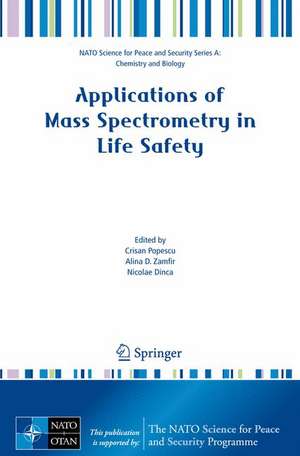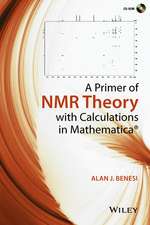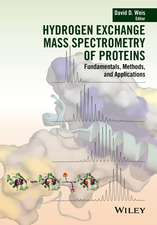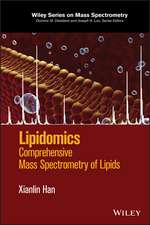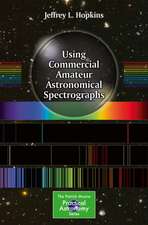Applications of Mass Spectrometry in Life Safety: NATO Science for Peace and Security Series A: Chemistry and Biology
Editat de Crisan Popescu, Alina D. Zamfir, Nicolae Dincaen Limba Engleză Hardback – 15 aug 2008
| Toate formatele și edițiile | Preț | Express |
|---|---|---|
| Paperback (1) | 926.14 lei 6-8 săpt. | |
| SPRINGER NETHERLANDS – 15 aug 2008 | 926.14 lei 6-8 săpt. | |
| Hardback (1) | 932.01 lei 6-8 săpt. | |
| SPRINGER NETHERLANDS – 15 aug 2008 | 932.01 lei 6-8 săpt. |
Din seria NATO Science for Peace and Security Series A: Chemistry and Biology
- 18%
 Preț: 943.77 lei
Preț: 943.77 lei - 18%
 Preț: 1358.04 lei
Preț: 1358.04 lei - 18%
 Preț: 936.95 lei
Preț: 936.95 lei - 24%
 Preț: 789.15 lei
Preț: 789.15 lei - 15%
 Preț: 627.61 lei
Preț: 627.61 lei - 18%
 Preț: 1204.16 lei
Preț: 1204.16 lei - 15%
 Preț: 624.57 lei
Preț: 624.57 lei - 15%
 Preț: 632.24 lei
Preț: 632.24 lei - 15%
 Preț: 639.44 lei
Preț: 639.44 lei - 18%
 Preț: 930.64 lei
Preț: 930.64 lei - 5%
 Preț: 993.36 lei
Preț: 993.36 lei - 5%
 Preț: 1388.63 lei
Preț: 1388.63 lei - 18%
 Preț: 1195.68 lei
Preț: 1195.68 lei - 18%
 Preț: 925.68 lei
Preț: 925.68 lei - 18%
 Preț: 926.14 lei
Preț: 926.14 lei - 15%
 Preț: 621.18 lei
Preț: 621.18 lei - 18%
 Preț: 921.98 lei
Preț: 921.98 lei - 24%
 Preț: 789.15 lei
Preț: 789.15 lei - 18%
 Preț: 1199.52 lei
Preț: 1199.52 lei - 18%
 Preț: 1195.68 lei
Preț: 1195.68 lei - 18%
 Preț: 1197.20 lei
Preț: 1197.20 lei - 15%
 Preț: 640.44 lei
Preț: 640.44 lei - 18%
 Preț: 923.52 lei
Preț: 923.52 lei - 18%
 Preț: 922.60 lei
Preț: 922.60 lei - 18%
 Preț: 1201.84 lei
Preț: 1201.84 lei - 15%
 Preț: 627.11 lei
Preț: 627.11 lei - 18%
 Preț: 1205.39 lei
Preț: 1205.39 lei - 5%
 Preț: 1390.97 lei
Preț: 1390.97 lei - 18%
 Preț: 1198.92 lei
Preț: 1198.92 lei - 5%
 Preț: 1072.43 lei
Preț: 1072.43 lei - 18%
 Preț: 1205.09 lei
Preț: 1205.09 lei
Preț: 932.01 lei
Preț vechi: 1136.59 lei
-18% Nou
Puncte Express: 1398
Preț estimativ în valută:
178.35€ • 187.63$ • 147.66£
178.35€ • 187.63$ • 147.66£
Carte tipărită la comandă
Livrare economică 14-28 ianuarie 25
Preluare comenzi: 021 569.72.76
Specificații
ISBN-13: 9781402088094
ISBN-10: 1402088094
Pagini: 270
Ilustrații: XII, 238 p.
Dimensiuni: 155 x 235 x 20 mm
Greutate: 0.61 kg
Ediția:2008
Editura: SPRINGER NETHERLANDS
Colecția Springer
Seria NATO Science for Peace and Security Series A: Chemistry and Biology
Locul publicării:Dordrecht, Netherlands
ISBN-10: 1402088094
Pagini: 270
Ilustrații: XII, 238 p.
Dimensiuni: 155 x 235 x 20 mm
Greutate: 0.61 kg
Ediția:2008
Editura: SPRINGER NETHERLANDS
Colecția Springer
Seria NATO Science for Peace and Security Series A: Chemistry and Biology
Locul publicării:Dordrecht, Netherlands
Public țintă
ResearchCuprins
Proteomics and Peptidomics.- Blue Native PAGE and Mass Spectrometry Analysis of Ephrin Stimulation-Dependent Protein-Protein Interactions in NG108-EphB2 Cells.- Structure, Processing, and Polymerization of Rainbow Trout Egg Vitelline Envelope Proteins.- MALDI/MS Comparison of Fe-NTA Immobilized Metal Affinity Chromatography and Commercially-Available Metal Oxide Affinity Resins for Phosphopeptide Enrichment.- Molecular Recognition Specificity of anti-3-nitrotyrosine Antibodies Revealed by Affinity-Mass Spectrometry and Immunoanalytical Methods.- Lipidomics.- Mapping and Sequencing of Gangliosides from Anencephaly by Electrospray Ionization High Capacity Ion Trap Mass Spectrometry.- Glycomics.- Structural Analysis of Chondroitin Sulfate Disaccharides by Electrospray Ionization High Capacity Ion Trap Mass Spectrometry.- Application of High Performance Mass Spectrometry to Structural Analysis of Glycosaminoglycan Oligosaccharides.- Site Specific Identification of N-Linked Glycosylation in Proteins by Liquid Chromatography–Electrospray Ionization Tandem Mass Spectrometry.- Immunology.- Characterization of Immune Responses to Pathogen Challenge by Ms-Based Epitope Mapping.- Chemical Surface Modification and Chemical Crosslinking Combined with Mass Spectrometry for Protein Tertiary Structural Information.- Small Molecules.- Brominated Flame Retardants: Analytical, Toxicological and Environmental Aspects.- Stereochemistry Studies of Some 1,3-dioxane Derivatives by Differential Mass Spectrometry and Computational Chemistry.- MALDI-TOF Mass Spectrometry in Textile Industry.- MALDI MS in Analysis of Keratin Fibre Proteins.- Electrospray Ionization Tandem Mass Spectrometric Investigation of Essential Oils from Melissa officinalis (Labiatae Family) and Pellargonium ssp.(Geraniaceae Family).- Chemical Structure Identification by Differential Mass Spectra.
Caracteristici
Mass spectrometry use to ‘Omics’ Mass Ssectrometry for immunology Mass Spectrometry use for controlling the environment Mass spectrometry for chemical structure identification
